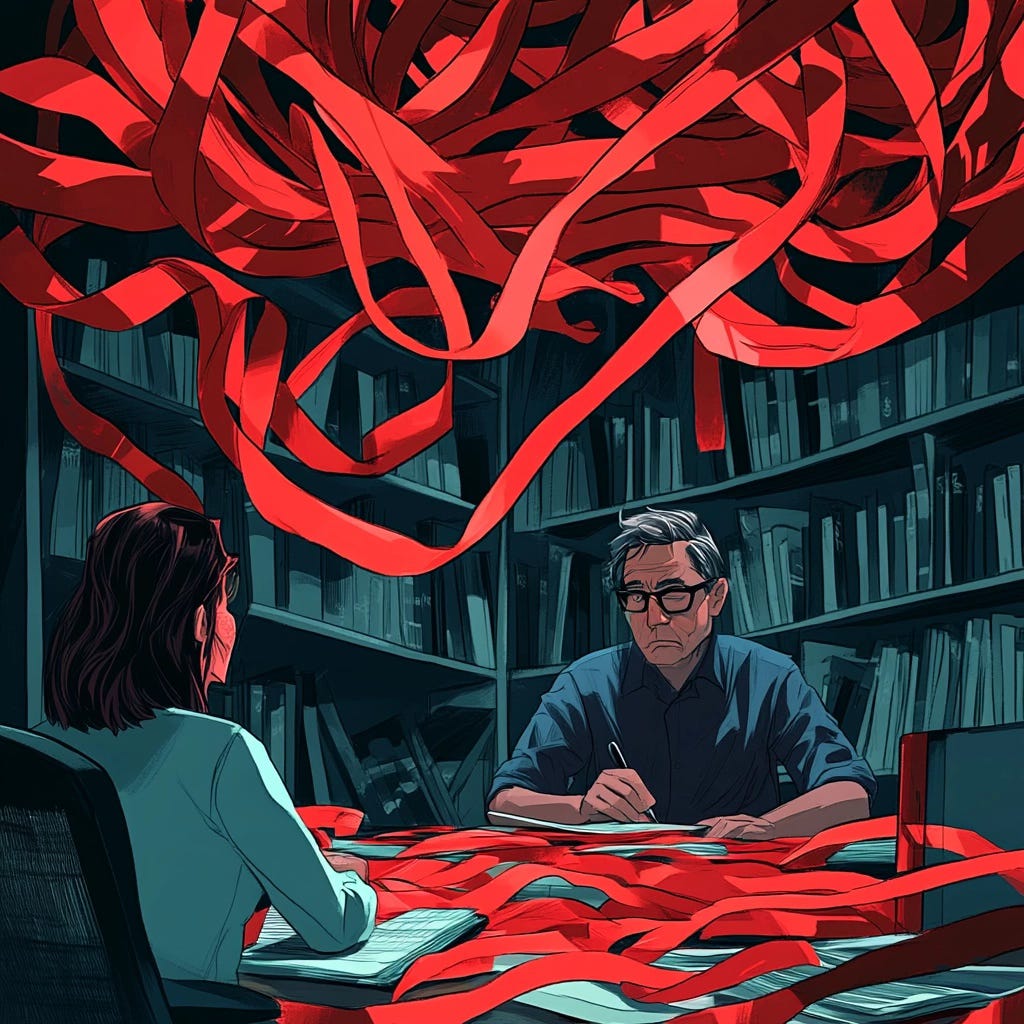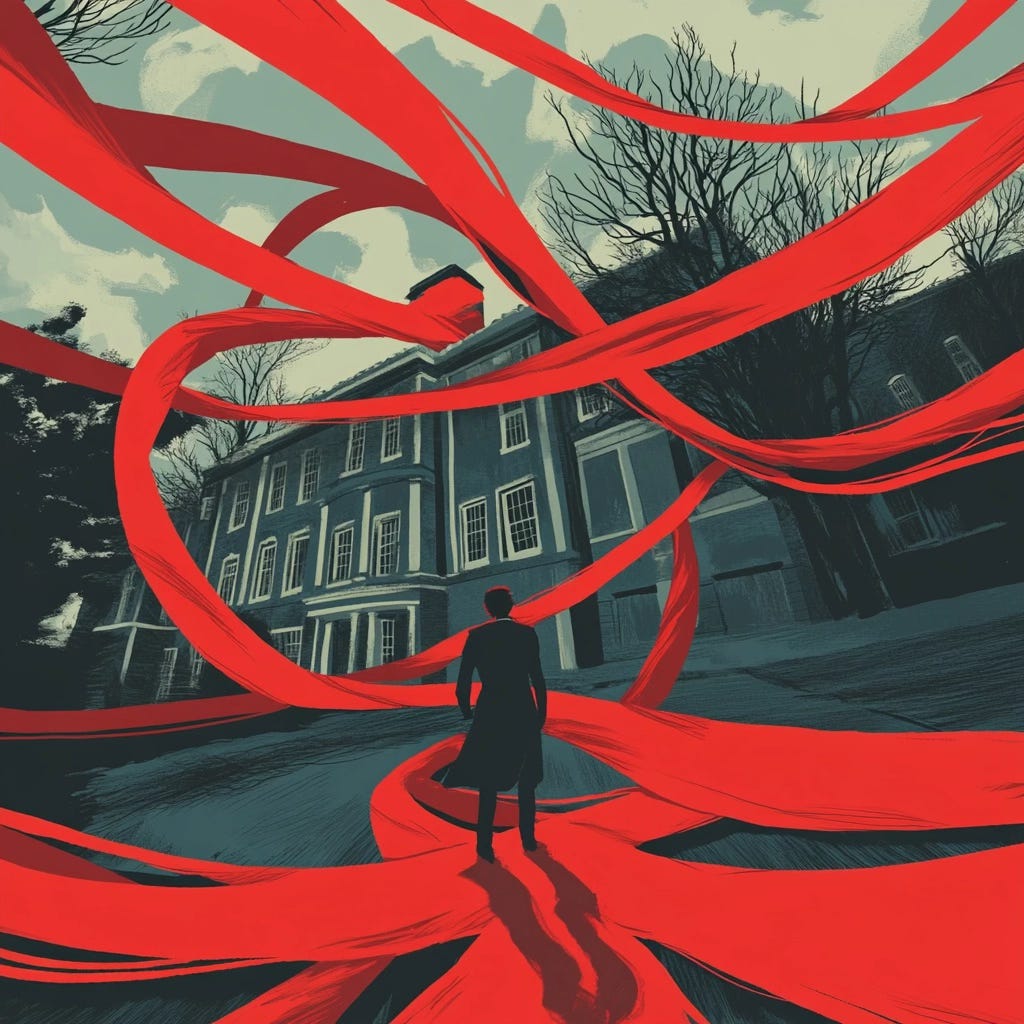Want to Fix the Culture? Start by Reforming Counseling Accreditation
The counseling profession is at a crossroads—let's help it choose healing over indoctrination.
The political stage is set. State and federal congresses are back in session, and a new presidential term begins. But with so many issues demanding reform, where should we focus first?
Look no further than the quiet crisis unfolding in counseling education. Before diving into the shocking realities uncovered in counseling textbooks and program details from across the country, we need to address why reforming this field is not just important—it’s urgent.
Most people do not give something like counseling a second thought. If things are going well in life, why would you? Few realize how deeply psychology and counseling shape modern culture.
Who Holds the Power in Mental Health?
To begin, let’s clarify what we are talking about. Therapy is a general term, and there are several pathways to becoming a therapist. These differences provide interprofessional friction points in the same way people in the Army will complain about the Navy, the Marines, and the Air Force and vice versa.
At the top of the hierarchy are psychiatrists. To reach this level requires going to medical school and doing a residency. While a psychiatrist, like all the subsequent mental health professions, is capable of providing talk therapy to individual clients, today many focus on prescribing psychiatric medication and more complicated mental conditions.
Psychiatrists and psychiatric nurse practitioners are the only groups that both prescribe medication and do talk therapy.
The American Psychiatric Association writes the Diagnostic and Statistical Manual of Mental Disorders (DSM) by forming task forces and work groups primarily populated by psychiatrists, some psychologists, and a smattering of other mental health professionals.
The DSM is the diagnostic bible for insurance companies and thus for all mental health and therapy practitioners.
Psychologists require a PhD. to practice. In prestige, they follow psychiatrists. While they cannot prescribe medications, they can do talk therapy and they can perform evaluations which other designations cannot. Some are strictly research-focused, some primarily perform evaluations, and others focus on clinical psychology treatment with talk therapy.
The remainder of therapists will have a background education in social work, marriage and family therapy, behavioral therapy, addictions, school counseling, and counseling.
Divorced from competition, each of these subgroups can help people on their journey to better mental health.
How Counseling Became a Political Tool
Unfortunately, we are not divorced from competition. This hit an inflection point for counseling back in 1988 at the first of a series of conventions of counselors, where the leadership discussed feeling the pinch and set out to find a way to set counseling apart. Ultimately, advocacy was chosen as the hallmark of the counseling.
It should be obvious that any mental health profession centering itself around something other than improving the mental health of its clients is a problem. What goes unnoticed is how an advocacy agenda upends the relationship between mental health and culture.
Unlike traditional medicine, where a broken leg in Cleveland, Ohio would also be a broken leg in Papua New Guinea, mental health is culturally defined. Behavior called anorexia in most Western cultures, could be seen as asceticism in other parts of the world, for example.
Prior to the shift toward valuing multiculturalism, psychology as a discipline followed and described behavior as the dominant culture saw things. Hearing voices was a marker of schizophrenia, not prophesy.
As a product of enlightenment sciences, psychology is a culture-based solution (science) to a culturally identified problem (people behaving in ways that conflict with dominant cultural goals.)
You can see this and observe the evolution in culture in issues like homosexuality. When it was culturally condemned, psychology sciences looked for cures. As culture changed and the behavior was scientifically validated as an inherent characteristic, it was accepted culturally and removed as a mental health diagnosis.
While the time required for attitudes to change and for data collection to clarify the underlying reality meant that many suffered undeserved social sanctions and persecution, the process ultimately worked.
Even with some remaining conflicts among those with religious worldviews, few would backtrack these hard won developments, The balance our law strikes with freedom to express dissenting points of view means there is now room for both with tolerance in between.
Multiculturalism wants to change that relationship. With the rise of advocacy in counseling specifically—this profession now moves to shape culture by dictating which behaviors should be seen as acceptable or pathological based on multicultural ideals.
It is a top-down approach.
It is most striking in current attitudes surrounding transgender behavior. In this area, psychology is taking a leading position. This started when the DSM-5 revision eliminated the “gender identity disorder” diagnosis and replaced it with a “gender dysphoria” diagnosis.
This change in definition opened the door to seeing one's gender as a matter of taste, rather than biological fact which must be accepted as the reality it is to achieve what Western culture defines as good mental health.
When the definition of ‘good mental health’ comes to include things that are objectively not true or impossible in enlightenment-based cultures, that’s when mental health professionals become agents of destruction rather than healers.
Should this sound alarmist, a quick reading of history shows that not only has psychology made major missteps (add lobotomies and eugenics to that list) in the past, and it has been outright weaponized when that suited the ends of the powers that be. The past is the script of the present unless we actively move to prevent it.
Psychology as a Cultural Weapon
The DSM listings are not just a matter for insurance codes, they also form the framework for public policy. For example, when the definition of gender disorders changed, public policy followed.
First in Denmark and later around the West, as homosexuality before it, when transgender behavior was no longer classified as a mental illness, it presumptively became a matter of civil rights.
The big problem here is that the changing of the diagnosis ignored the vast majority of the science and objective reality that sex is an immutable characteristic.
“The new diagnosis recognized that a mismatch between one’s birth gender and identity was not necessarily pathological, notes pediatric endocrinologist Norman Spack, a founder of the gender clinic at Boston Children’s Hospital. It shifted the emphasis in treatment from fixing a disorder to resolving distress over the mismatch.”
While it is true that a tiny minority of people do suffer syndromes that affect sex development, which is its own tragedy and may include gender dysmorphia, the vast majority of people who suffer gender dysmorphia experience it as a co-morbid condition with diagnoses such as personality disorders and paraphilias. In teens, it is associated with emerging homosexuality.
Helen Joyce points out that even these possible causes are subordinate to the influence of cultural perceptions themselves.
Untangling these threads belongs in the therapy room and research. Not public policy.
While transgender issues may be the most recent and noteworthy instance of psychological quandaries prematurely supported with public policy, the issue is less the nature of whatever underlies transgender beliefs, and much more the rapidity that this was accepted into law and corporate culture where it has affected the lives of millions of people.
For the discipline of counseling in particular, when it split its mission to advocacy it lost objectivity. In a position to influence public policy, and with an internal mandate to do so, through professional organizations like the American Counseling Association (ACA), the National Board for Certified Counselors (NBCC), the Council for Accreditation of Counseling and Related Educational Programs (CACREP) and several others, counseling was a significant player in rewriting the cultural rules that stole essential freedoms and put many lives at risk.
To move forward without addressing the role counseling in particular played in getting us here is to dust the shelves while the house burns down.
With an epidemic of suicide among white men, as counseling beats the drum of both white and male toxicity, arguably there are even deaths that can be traced to the profession’s dereliction of duty to promote mental health and wellness.
When Counseling Becomes Coercion
In the ways that counseling as a profession has abandoned what should have been its north star, addressing issues of mental health with individual clients, it has also undermined freedoms protected in the U.S. Bill of Rights, as another part of the ‘monoculture’ it disdains.
Even if we discount how counselor training programs trample the First Amendment rights of counselor trainees like Jennifer Keeton, Leslie Elliot Boyce, Lauren Holt, myself, and others across the country who chose to leave quietly, the reach of counseling over what people can do and say is longer than you might expect.
In July of 2024, I reported on a case in Indiana where not only were parents banned from speaking about their religious beliefs in their own home as the result of court-ordered therapy but ultimately they lost custody of their child even when the court stipulated there was no finding of neglect or abuse.
In schools, counselors have adopted a position supporting transgender teens playing on sports teams and using bathrooms that affirm their beliefs, ignoring the rights of everyone else. In the case of female students, this also comes at the cost of their safety and fairness in sports.
This doesn’t even begin to address where counselors are leading clients to focus on race, gender, and other personal characteristics instead of their mental or emotional problems.
Taking a step back from issues that are currently culturally charged, counselors also have the power to initiate an involuntary psychiatric hold, when adjudicated this can affect your Second Amendment rights later on down the road.
While these procedures may be life-saving, both for the person placed on an involuntary hold and for innocent bystanders when a person has lost their bearings in our culturally agreed on objective reality or their emotional control, for this to work on a societal level there must be a deep sense of trust in the process which means in the psychology professions themselves.
The worst cut of all is that, as a profession, counseling has been throwing away that trust with both hands. This is a disaster for all the culturally coherent counselors working based on traditional best practices. Not to mention all the people struggling through life without proper support.
CACREP: The Ideological Gatekeeper
The good news is that it doesn’t have to be this way. And while the ideological problems are pervasive in the leadership of the ACA, the NBCC, CACREP, and many college training programs around the country, radical changes could be made with some speed by focusing efforts to curtail the group that has done the most to force this ideology on everyone, CACREP.
In its role as accreditor, CACREP has worked since 1981 to standardize the counseling profession. While standardization may sound like a good idea at first blush, what it has come to mean in practice is an increasingly uniform curriculum and an overbearing push for a uniform professional identity.
This professional identity includes values based on multiculturalism and critical theories. It has students shelling out tens of thousands of dollars while they are being evaluated on their beliefs, not their coursework.
After significant money is spent, students are over a barrel to parrot ideological talking points or lose their investment in education and a career. The tenets of good therapy become little more than a side note.
This is what standardization looks like in practice. In the coming weeks, I’ll reiterate that in mission statements, curriculum, and standards for evaluating ‘dispositions’ among other things.
However uniform compliance is not the same as uniform belief. While many counseling educators are likely true believers that their way is the ‘right’ way and Social Justice Ideology is their undeniable truth, not everyone believes that.
Just as many counseling students have been pushed out by the purity CACREP standards require, so too have counseling professors who won’t toe the line.
A landscape without CACREP would provide the opportunity for dissenting individuals to step forward. Without requirements for highly degreed professors, you’d even find star therapists working in the field who could step in and teach the next generation.
Like everything else, it’s not a prescription for perfection, so much as it would be a release from toxicity, dysfunction, and professional self-destruction.
As the authority that mandates all of this nonsense, CACREP is the lynchpin to widespread change. With focused consistent legislative efforts to remove CACREPs power, the whole system will be altered.
The best news of all, we can get started right now.
Help Keep This Conversation Going!
Share this post on social media–it costs nothing but helps a lot.
Want more perks? Subscribe to get full access to the article archive.
Become a Paid Subscriber to get video and chatroom access.
Support from readers like you keeps this project alive!
Diogenes in Exile is reader-supported. If you find value in this work, please consider becoming a pledging/paid subscriber, donating to my GiveSendgo, or buying Thought Criminal merch. I’m putting everything on the line to bring this to you because I think it is just that important, but if you can, I need your help to keep this mission alive.
Already a Premium subscriber? Share your thoughts in the chat room.
About
Diogenes in Exile began after I returned to grad school to pursue a Clinical Mental Health Counseling master’s degree at the University of Tennessee. What I encountered, however, was a program deeply entrenched in Critical Theories ideology. During my time there, I experienced significant resistance, particularly for my Buddhist practice, which was labeled as invalidating to other identities. After careful reflection, I chose to leave the program, believing the curriculum being taught would ultimately harm clients and lead to unethical practices in the field.
Since then, I’ve dedicated myself to investigating, writing, and speaking out about the troubling direction of psychology, higher education, and other institutions that seem to have lost their way. When I’m not working on these issues, you’ll find me in the garden, creating art, walking my dog, or guiding my kids toward adulthood.
You can also find my work at Minding the Campus









